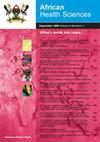Non-specialized care of skin disorders: a cross-sectional survey of new patients attending dermatology clinic in a tertiary hospital in Jos, Northcentral Nigeria
IF 0.9
4区 医学
Q3 MEDICINE, GENERAL & INTERNAL
引用次数: 0
Abstract
Background: Given the paucity of skin health specialists in Nigeria and the low level of awareness amongst its populace, patients seek for care for skin related disorders from different sources and are given a variety of remedies before accessing specialist care. Objectives: This study was aimed at describing outlets visited and medication received by patients with skin disorders prior to attending the dermatology outpatient clinic in JUTH. Methods: This was a cross sectional study conducted over one year. Information on socio-demography, sources and medication received prior to presentation was obtained and analysed using SPSS 23. Results: The male: female ratio among 166 consenting new patients was 1:1.4. Prior to presentation patients sought care most frequently from Health facilities (68.1%), Patent medicine vendors-PMV (30.7%) and Traditional healers (21.7%). Overall, different steroid preparations were the most commonly used medications (56.6%) across all age groups with fixed combination preparations most frequently used (32.5%). Unconventional substances reportedly used by patients for skin disorders were urine, toothpaste, tomatoes, salt, water in which a life catfish had been kept and fats from a dead dog. Only 21.1% of the patients did not use any medication prior to presentation. Conclusion: There is need to increase capacity in the care of common skin diseases at all levels of the health care system to decrease patronage of unconventional providers. Raising awareness of the general public on the potential dangers of inappropriate treatment of skin diseases and strengthen referral system is imperative to reduce the burden of skin diseases in the country. Keywords: Non-specialized; skin diseases; unorthodox; treatment; dermatology; clinic.皮肤病的非专业护理:尼日利亚中北部乔斯一家三级医院皮肤科门诊新患者的横断面调查
背景:由于尼日利亚缺乏皮肤健康专家,而且民众对皮肤健康的认识水平较低,因此患者从不同渠道寻求与皮肤有关的疾病的护理,并在获得专家护理之前获得各种补救措施。
目的:本研究旨在描述在JUTH皮肤科门诊就诊前皮肤病患者访问的网点和所接受的药物。方法:这是一项为期一年的横断面研究。使用SPSS 23获取和分析患者的社会人口学、药物来源和用药情况。
结果:166例自愿新入组患者男女比例为1:1.4。发病前,患者最常向卫生机构(68.1%)、专利药品供应商(30.7%)和传统治疗师(21.7%)寻求治疗。总体而言,不同类固醇制剂是所有年龄组中最常用的药物(56.6%),固定联合制剂最常用(32.5%)。据报道,皮肤病患者使用的非常规物质有尿液、牙膏、西红柿、盐、养过活鲶鱼的水和死狗的脂肪。只有21.1%的患者在发病前未使用任何药物。
结论:需要提高各级卫生保健系统对常见皮肤病的护理能力,以减少非常规提供者的惠顾。提高公众对皮肤病治疗不当的潜在危险的认识并加强转诊制度,对于减轻该国的皮肤病负担至关重要。关键词:非专业化;皮肤疾病;非正统的;治疗;皮肤病;诊所。
本文章由计算机程序翻译,如有差异,请以英文原文为准。
求助全文
约1分钟内获得全文
求助全文
来源期刊

African Health Sciences
MEDICINE, GENERAL & INTERNAL-
CiteScore
2.30
自引率
0.00%
发文量
179
审稿时长
>12 weeks
期刊介绍:
The African Health Sciences is an internationally refereed journal publishing original articles on research, clinical practice, public health, policy, planning, implementation and evaluation, in the health and related sciences relevant to Africa and the tropics. Its objectives are to: Advocate for and promote the growth of reading culture in sub Saharan Africa; Provide a high quality journal in which health and policy and other researchers and practitioners in the region can and world wide, can publish their work; Promote relevant health system research and publication in the region including alternative means of health care financing, the burden of and solution of health problems in marginalized urban and rural communities amongst the displaced and others affected by conflict; Promote research and the systematic collection and collation and publication of data on diseases and conditions of equity and influence; Promote development of evidence-based policies and guidelines for clinical, public health and other practitioners. African Health Sciences acknowledges support provided by the African Health Journals Partnership Project that is funded by the US National Institutes of Health (through the National Library of Medicine and the Fogarty International Center) and facilitated by the Council of Science Editors.
 求助内容:
求助内容: 应助结果提醒方式:
应助结果提醒方式:


